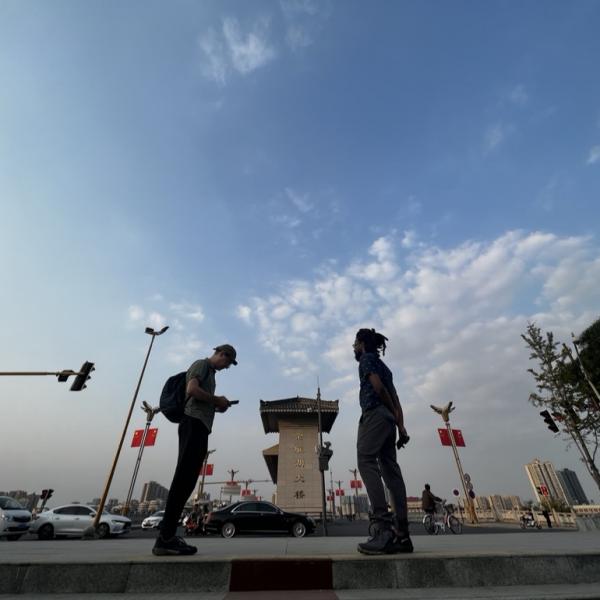The Senior Honors Thesis is a year-long process that requires students to write a 75 to 125 page thesis on a topic of their choice. The History Department strongly encourages potential writers to develop thesis topics and let advisors know of their interests during the junior year. Yet, many students may not know much about the Senior Honors Thesis Program and have difficulties in laying the groundwork – selecting thesis advisors, finding content, and developing historical arguments – for the actual thesis. For these reasons, I decided to write an article concerning the Senior Thesis preparation process, which hopefully gives some insight for undecided juniors and underclassmen. In the paragraphs below, I will recap my interview with Professor Sonia Lee, who is the Director of the Senior Honors Thesis Program. Moreover, Ben Greenho, who is also writing a Senior Thesis, and I will give some advice on what juniors need to consider before writing a Senior Thesis.
Jeff Kang:
Do you have any advice for juniors who are seriously considering writing a Senior Thesis?
Professor Sonia Lee:
The student should select a general topic of interest and then ask a faculty member of the History Department whether or not they are willing to be their thesis advisor. Hopefully, this will be a person with whom he or she has taken at least one class. It is ideal that the potential advisor knows the student fairly well so that the advisor can assess the student’s ability to successfully write a thesis. I would say that the early spring semester of your junior year is the best time to secure an advisor because typically, members of the History Department are willing to take up to two advisees for the Senior Thesis. If you approach them too late, they may have to decline working with you.
Potential thesis writers should also think about student funding. The Undergraduate Research Office’s application deadline for student research funding is March 1st. The Office will require those looking for funding to submit a one to two-page proposal, which includes a description of their research project, a recommendation letter written by their thesis advisor
and an itemized budget. This may sound a bit complicated, but it is actually rather simple. The majority of the students who apply get funding. As long as you have a general idea of your thesis topic, a preliminary understanding of the scholarship and potential archives, and an estimate of travel expenses, you should be fine. If you realize afterwards that no funding is needed, that is perfectly fine; just let the Office know.
I encourage all juniors to apply for funding because more likely than not, they are going to need money to conduct research. Besides, this is a great way for college students to travel and see new places, even if they are going to spend a lot of time in the archives. After the archives close (around five in the evening) and during the weekends, they can explore the city.
Finally, during the summer of their senior year, thesis writers need to read the secondary sources that are relevant to their topic. They must also go to the archives and collect the primary sources that are relevant to their topic. By the beginning of their senior year, students should have collected most of their primary sources. This will allow them to spend most of their fall semester sorting out the primary sources and writing.
Jeff Kang:
Could you offer some words of advice on what juniors should consider before writing a Senior Thesis?
Ben Greenho:
It is never too early to start looking into potential topics. There is so much research out there and the sooner you start looking to narrow down your focus, the better. I would also say, talk with professors whose classes you have already taken to see if your ideas fit into their areas of expertise. It is much better to work with an advisor with whom you have already established a relationship because it makes the whole process go more smoothly.
- Ending Words:
First, I recommend that all History Majors consider writing a Senior Thesis because it will likely be one of your most memorable intellectual experiences as a college student. However, as my major advisor told me during the first and second semester of my junior year, it is not for everyone. The thesis is not something that you can get done by putting in a little bit of extra effort. Potential thesis writers need to realize that the yearlong assignment will require them to dedicate a lot of their time. WebSTAC quantifies the Senior Thesis Colloquium (History 399) as four credits per semester; in reality, the workload adds up to six credits or more per semester. Also, students have to spend a good chunk of their winter break revising their thesis. I suggest that all juniors who have decided to write the thesis take more credits during their third year. This will give them more time in their senior year to commit to the thesis. Remember that during the school year, writers must not only pay attention to their thesis and schoolwork, but also develop post-graduation plans for work or graduate school.
Also, potential thesis writers must prepare to dedicate a bulk of their summer for independent research. Consequentially, they – especially those focusing on non-US history – may have to sacrifice internship and work opportunities. No one wants to return to school having accomplished insufficient research, as he or she will most likely not be able to return to archives and libraries for supplementary reading. For instance, since I chose to write my Senior Thesis on late nineteenth century Chosŏn (Korea), I spent most of my summer reading primary sources in Seoul, South Korea. In addition, if possible, try to find an online database for primary sources that you can access from overseas.
Know what you want. Spend time thinking about post-graduation plans and what you expect to get out of the Senior Thesis before deciding to write it. If you majored in History just to get a humanities education and want to find employment in professional fields such as consulting, marketing, or journalism, you may want to think twice about writing a thesis. Rather than selecting the Senior Thesis option, such students should take an Advanced Seminar or do an Independent Study. On the other hand, students looking to apply to graduate schools should definitely write a Senior Thesis. It will surely aid their application process.




